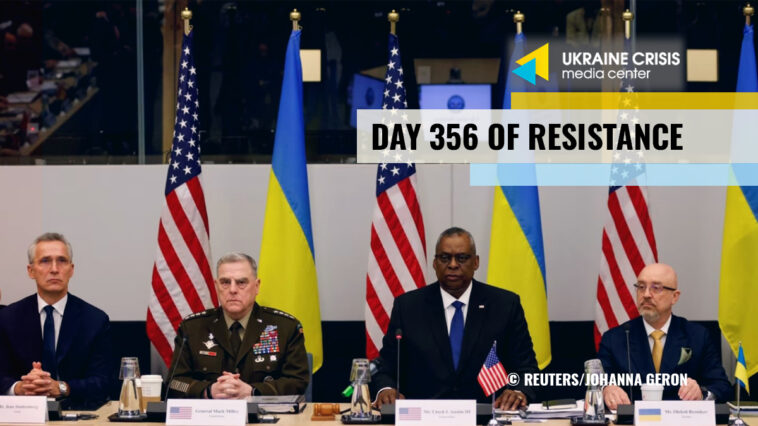Ninth meeting of Ukraine Defense Contact Group
The Ukraine Defense Contact Group met on Tuesday, February 14, at the NATO headquarters. The ninth meeting brought together defense officials from more than 50 nations.
Ukraine’s allies were joined by representatives from the Ukrainian Defense Ministry, military intelligence, General Staff of the Ukrainian Armed Forces, and diplomats.
The Leopard tanks pledged to Kyiv are expected to be delivered to Ukraine in March, Polish Defense Minister Mariusz Blaszczak is quoted as saying after the meeting.
U.S. Secretary of Defense Lloyd Austin said allies will do everything they can to ensure that they get Ukraine as much ammunition as it needs as quickly as possible. “We are working with the Ukrainian soldiers in various places throughout Europe to emphasize additional training on maneuver,” Austin told a press conference. There’s a good chance that as the battlefield is shaped with maneuvering, the Ukrainian troops will require less artillery munitions, he added. “We are going to do everything we can to make sure that they have what they need to be successful,” the U.S. Defense Secretary said.
Austin said he expected Ukrainian forces to conduct an offensive of their own in the spring, and Ukraine’s allies were working to ensure they had the armor, firepower and the logistics to make it effective.
“I don’t have any announcements on aircraft to make today,” Austin told reporters after chairing a meeting of the Ukraine Defense Contact group at NATO headquarters.
The allies will continue to work with Ukraine to address its most pressing needs as Ukraine prepares for a counteroffensive in the spring, he said. Austin returned focus to the assistance that allies had committed to Ukraine. “If you think about the numbers of systems that we’re bringing together, it’s a monumental task to bring all those systems together, get the troops trained on those platforms, and get those systems into the fight,” U.S. Defense Secretary said.
Russia attempts to devastate water supply to Ukraine’s south
As Russia is draining the Kakhovka reservoir, at stake is drinking water for nearby towns and villages, and the cooling system for the Zaporizhzhia nuclear power plant, Ukraine’s Prime Minister Denys Shmyhal said during the cabinet meeting on Tuesday.
“The Russians are now trying to cut water off from the Ukrainians. After the Russians partly damaged the dam and deliberately opened the sluice gates at the Kakhovka hydroelectric power plant, we are losing thousands of cubic meters of water every day,” Shmyhal said. A drop in the water level in the storage facility could lead to a nuclear incident at the Zaporizhzhia nuclear power plant, he added.
The Kakhovka hydroelectric power plant is Ukraine’s fifth largest hydroelectric power facility. Its generation capacity is 334.8 megawatts. The plant was constructed in 1965. It is run by the state-owned Ukrhydroenergo company. The plant was occupied on day two of Russia’s invasion of Ukraine, and, since then, has been operating at limited capacity. In August 2022, only three of the plant’s six units were operational, reducing the plant’s capacity to 30-40 per cent, director general of Ukrhydroenergo Ihor Syrota said. The damage sustained by the company because of the war exceeds UAH one billion (approx. USD 27.2 million), he added.
The Zaporizhzhia regional military administration said in a statement that if the level of the reservoir fell below 13.2 meters, the Zaporizhzhia nuclear power plant’s cooling system, which relies on water from the reservoir, would be in peril.
Officials stated that Ukrhydroenergo believed that the discharge did not result from the damage sustained by the Kakhovka hydroelectric power plant. It is being done deliberately by the Russians who opened the station’s locks fearing an advance of Ukrainian soldiers, the statement reads.
Cybersecurity in the times of destructive russian cyberattacks. Ukraine in Flames #341
The digital warfare is part of what Ukraine considers war crimes committed against its citizens as russia has been launching cyberattacks on Ukrainian critical and civilian infrastructure in coordination with military attacks as part of its invasion plan. Watch Ukraine in flames #341 to find out what changes last year has brought to Ukraine’s cybersecurity and how the country is protecting itself from russian cyberattacks.
Guests:
- Roman Osadchuk, Research Associate for Eurasia at the Atlantic Council’s Digital Forensic Research Lab (DFRLab)
- Vitaliy Yakushev, CEO at cybersecurity consulting firm 10Guards




